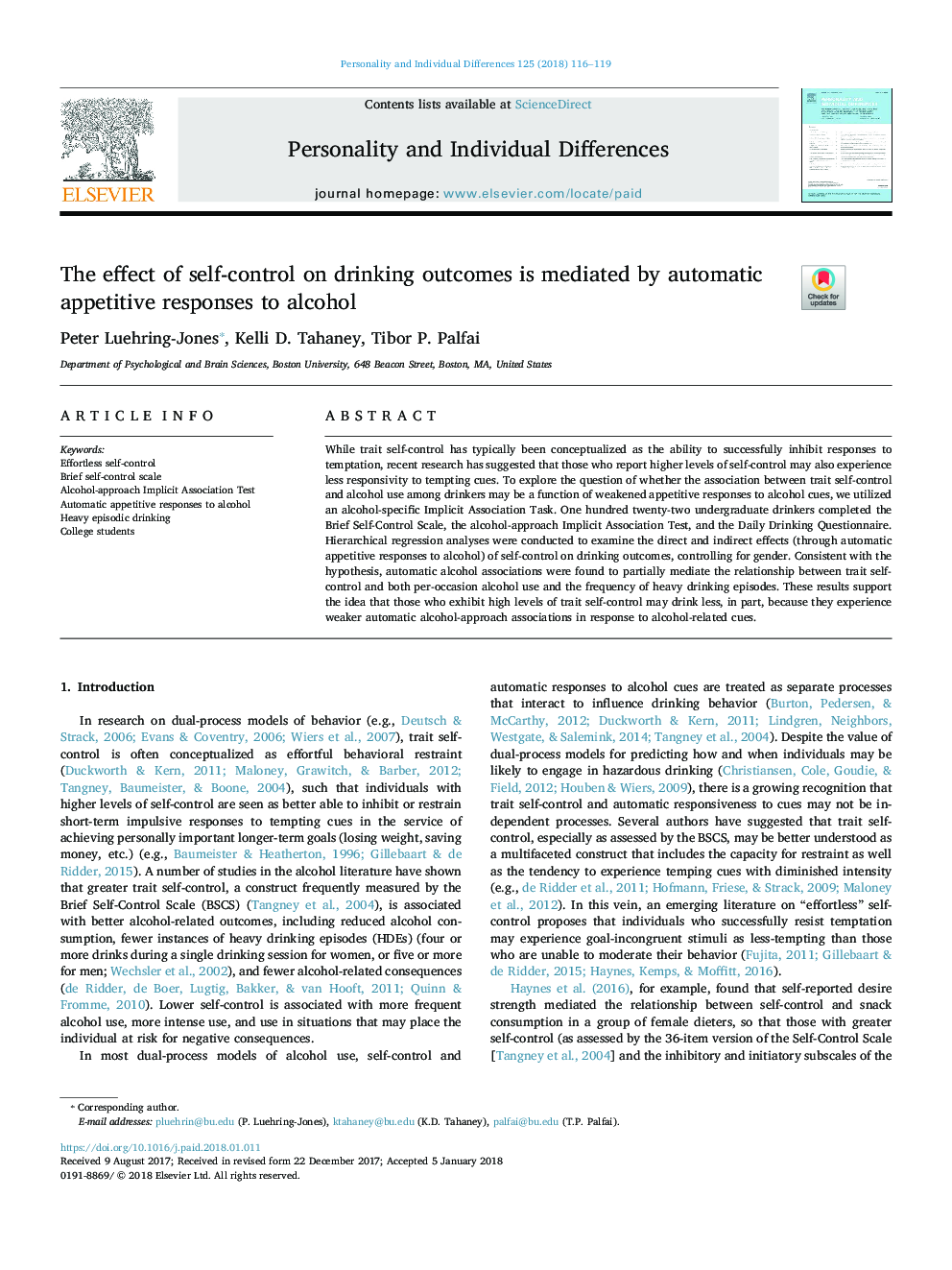| کد مقاله | کد نشریه | سال انتشار | مقاله انگلیسی | نسخه تمام متن |
|---|---|---|---|---|
| 7249023 | 1471993 | 2018 | 4 صفحه PDF | دانلود رایگان |
عنوان انگلیسی مقاله ISI
The effect of self-control on drinking outcomes is mediated by automatic appetitive responses to alcohol
ترجمه فارسی عنوان
تأثیر کنترل خود بر نتایج نوشیدنی به وسیله پاسخ خودکار اشتها به الکل متمرکز می شود
دانلود مقاله + سفارش ترجمه
دانلود مقاله ISI انگلیسی
رایگان برای ایرانیان
کلمات کلیدی
کنترل خودکفایی، مقیاس کنترل خود مختصر، تست وابستگی نامتجانس الکل، پاسخ خودکار اشتها به الکل، نوشیدن مقعدی سنگین، دانشجو،
ترجمه چکیده
در حالی که خود کنترل کنترل صریح به طور کلی به عنوان توانایی موفقیت آمیز مانع پاسخ به وسوسه شناخته شده است، تحقیقات اخیر نشان داده است که افرادی که سطح بالاتری از خود کنترل را گزارش می دهند نیز ممکن است نسبت به نشانه های وسوسه انگیز کمتر پاسخ دهند. برای بررسی این مسئله که آیا ارتباط بین خودکشی صفت و مصرف الکل در میان نوشیدنی ها ممکن است از پاسخ های اشتباه تضعیف شده به نشانه های الکل باشد، از یک وظیفه نامطلوب مشخص الکل استفاده کردیم. یکصد و بیست و دو دانشجوی کارشناسی ارشد مقیاس خودآزاری کوتاه، آزمون اتحاد انجمن معتبر الکل و پرسشنامه نوشیدن روزانه را تکمیل کردند. تجزیه و تحلیل رگرسیون سلسله مراتبی برای بررسی اثرات مستقیم و غیرمستقیم (از طریق پاسخ خودکار اشتها به الکل) کنترل خود بر نتایج نوشیدن، کنترل جنسیت انجام شد. مطابق با فرضیه، ارتباطات خودکار الکل، به طور جزئی، میانجی خود را کنترل صفت و مصرف الکل هر دو ساعته و فرکانس موارد نوشیدن سنگین میداند. این نتایج از این ایده حمایت می کند که کسانی که سطح بالایی از خود کنترل خود را نشان می دهند، ممکن است بخشی از آن را کاهش دهند، زیرا در واکنش به نشانه های مربوط به الکل، آنها از طریق ارتباطات متقابل الکل به طور خودکار ضعیف تر می شوند.
موضوعات مرتبط
علوم زیستی و بیوفناوری
علم عصب شناسی
علوم اعصاب رفتاری
چکیده انگلیسی
While trait self-control has typically been conceptualized as the ability to successfully inhibit responses to temptation, recent research has suggested that those who report higher levels of self-control may also experience less responsivity to tempting cues. To explore the question of whether the association between trait self-control and alcohol use among drinkers may be a function of weakened appetitive responses to alcohol cues, we utilized an alcohol-specific Implicit Association Task. One hundred twenty-two undergraduate drinkers completed the Brief Self-Control Scale, the alcohol-approach Implicit Association Test, and the Daily Drinking Questionnaire. Hierarchical regression analyses were conducted to examine the direct and indirect effects (through automatic appetitive responses to alcohol) of self-control on drinking outcomes, controlling for gender. Consistent with the hypothesis, automatic alcohol associations were found to partially mediate the relationship between trait self-control and both per-occasion alcohol use and the frequency of heavy drinking episodes. These results support the idea that those who exhibit high levels of trait self-control may drink less, in part, because they experience weaker automatic alcohol-approach associations in response to alcohol-related cues.
ناشر
Database: Elsevier - ScienceDirect (ساینس دایرکت)
Journal: Personality and Individual Differences - Volume 125, 15 April 2018, Pages 116-119
Journal: Personality and Individual Differences - Volume 125, 15 April 2018, Pages 116-119
نویسندگان
Peter Luehring-Jones, Kelli D. Tahaney, Tibor P. Palfai,
